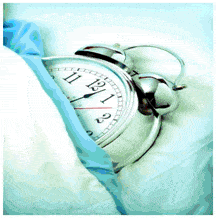Pillow Talk: Get a Restful Night's Sleep

At one time or another, most of us have experienced what it’s like to have trouble falling asleep, to lie awake in the middle of the night, or to feel sleepy and fatigued during the day. However, when sleep problems are a regular occurrence - when they get in the way of your daily routine and hamper your ability to function, the issue of sleeplessness should be seriously considered.
If you’re having trouble sleeping , you’re in good company. According to the National Commission on Sleep Disorders, at least 40 million Americans suffer from chronic, long-term sleep disorders and another 60 million experience occasional sleep problems. Unfortunately, even minimal sleep loss takes a toll on your mood, energy, efficiency, and ability to handle stress. Ignoring sleep problems and disorders can lead to poor health, accidents, impaired job performance, and relationship stress. If you want to feel your best, stay healthy, and perform to your potential, sleep is a necessity, not a luxury. The first step toward discovering what’s keeping you up at night is to rule out more serious causes of insomnia, including anxiety, depression, medications, smoking, sleep apnea, hormonal imbalances or pain. It’s important to work with your health care provider to rule out these possibilities. Most often, though, a combination of factors is triggering your inability to rest. Somewhere, somehow, some aspect of your life doesn’t fit with who you are or what you want. Whether physical or psychological, fortunately there are simple ways to improve the likelihood that you'll get a good night’s sleep. These techniques are known as “sleep hygiene”. While good sleep hygiene is important for everyone, it’s especially important for those who have trouble sleeping. So, let’s review some important sleep-promoting behaviors. Improve Your Sleep Environment Make sure your bedroom is dark and quiet. Room temperature can also affect sleep. You’ll fall asleep easier and be more likely to stay asleep when your room is comfortably cool. Likewise, it's important to sleep on a mattress that's comfortable for you.
Don't Do It In Bed Many people watch television or read in bed each night before going to sleep. Unfortunately, if you have problems sleeping, these activities are likely to make your insomnia worse. This is true for other activities too, such as eating, writing, talking on the phone, or using your laptop in bed. As with getting into bed too early, engaging in stimulating activities in bed trains your body to think it's okay to feel wide awake when you're in bed. Eat, Drink And Be... Awake One cup of coffee in the morning is unlikely to have much effect on your nighttime sleep. But, since caffeine can take from three to ten hours to be metabolized, another cup in the afternoon, and/or chocolate after dinner can certainly interfere with a restful night’s sleep. Alcohol can affect sleep, too. Many people ask if having a glass of wine or a beer will help them fall asleep. However, in spite of how common this practice is, drinking alcohol definitely isn't the answer to your sleep problem. Although you may find that you fall asleep more easily after having a couple of drinks in the evening, alcohol tends to disrupt sleep.
Food can affect your slumber as well, so don’t eat a heavy meal too close to bedtime. If you're sensitive to tomato products or spicy food, lying down can aggravate heartburn, which can make falling asleep more difficult or wake you up in the middle of the night. Workout Regular exercise is helpful against insomnia, but not within three hours of bedtime. Exercise is energizing and raises your body temperature. Try to arrange your workout either in the morning or late afternoon. Make A Routine Go to bed at the same time every night. Practice nighttime relaxation routines, such as muscle relaxation, meditation or listening to guided imagery. Guided imagery can be very helpful in dealing with sleeplessness; it can offer acceptable suggestions about relaxation so that sleep can come. Most helpful is guided imagery like “Pillow Talk” that fosters control over the stressors that seem to get in the way of falling asleep and staying asleep. Pillow Talk
Changing Lifestyle is very excited about the introduction of “Pillow Talk... techniques and guided imagery for a restful night’s sleep” to their Speak to Me Series.
Using Pillow Talk you’ll discover simple, proven techniques designed to promote quality rest, followed by dynamic guided imagery that will transport your mind and body into a deep restorative sleep.
by Dr. J. Criscuoli & Professor M. Gulino
Co-directors - Changing Lifestyle
Related Products
Related Articles
Changing Lifestyle is a not-for-profit organization with a two tier approach to wellness… counseling (individual and group) and wellness programs. Their team is extremely successful for clients with insomnia, anxiety, depression, relationship issues, food & smoke cravings and many other health concerns. The directors now share their programs with your through the “Speak to me Series”.











